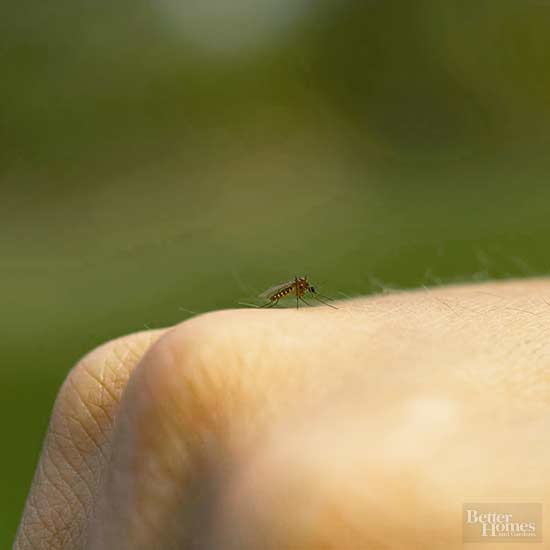






Mosquitoes are a real challenge in climates with frequent rainfalls. Highly annoying for their bites that itch and sting, mosquitoes also can carry West Nile virus and other diseases.
The most basic solution is to remove and drain any standing water where mosquitoes can breed. Water that is regularly moved or rotated with a pump is less likely to harbor mosquito eggs. Children's swimming pools, open buckets, tires, cans, and clogged gutters should all be emptied at least weekly.
If you have standing water that can't be removed, buy larvicide products with a biological control to dunk into the water on a regular basis.
You can try mechanical products such as bug zappers and other electronic devices, but research indicates they may kill more beneficial insects than pests and may not work well. Electric or propane suction traps can work under the right conditions, but depending upon their placement location, wind direction, and trapping efficiency, traps may actually draw more mosquitoes into an area than they catch, according to the American Mosquito Control Association. This group also warns that mosquito misting systems can have several adverse effects, including killing beneficial insects, promoting insecticide resistance, and creating risks to people, pets, and birds from extra pesticide exposure.
Citronella candles, coils, and torches help repel mosquitoes in the areas covered by the smoke, but wind can limit their effectiveness.
continue reading belowBe aware that "natural" bug sprays or plant-based insect repellents are still formed with chemicals.
The Centers for Disease Control has studied repellents and found these products (and others not listed) provide "reasonably long-lasting protection" using the following active ingredients:
DEET. Products containing DEET include Off!, Cutter, Sawyer, and Ultrathon.
Picaridin. Products containing picaridin include Cutter Advanced and Skin So Soft Bug Guard Plus.
Oil of lemon eucalyptus (OLE) or PMD. Products containing OLE and PMD include Repel and Off! Botanicals. Pure oil of lemon eucalyptus (essential oil not formulated as a repellent) is not recommended as it has not undergone similar, validated testing for safety and efficacy and is not registered with EPA as an insect repellent.
IR3535. Products containing IR3535 include Skin So Soft Bug Guard Plus Expedition and SkinSmart.
Plants growing in the ground won't repel mosquitoes. However, you can rub the crushed leaves or flowers of some plants on your skin as a natural insect repellent. Test a small amount on your inner forearm for a day to be sure you don't have an allergic reaction.
Citronella grass (Cymbopogon nardus) and its cousin lemon grass (Cymbopogon citratus) contain ingredients often used in bug repellent oils and sprays. These grasses are intolerant of cold temperatures and grow year-round only in USDA Zone 10 and warmer. Grow them in full sun in well-drained soil or containers.
Catnip (Nepeta cataria) has strong insect repellent properties. Grow it in full sun in well-drained soil. It is perennial throughout most of the United States. It spreads easily, so plant it where you can contain the spread.
Other plants that may work as natural mosquito repellents, to varying degrees, include eucalyptus, lavender, basil, and garlic.
The American Academy of Pediatrics and Centers for Disease Control recommend that DEET products should not be used on children younger than 2 months.
A repellent containing 10 to 30 percent DEET that will be effective for two to five hours can be used for older children.
"Choose the lowest concentration that will provide the required length of coverage," says the AAP. "The concentration of DEET varies significantly from product to product, so read the label of any product you purchase."
Always wash off repellents when children return indoors.
Copyright © www.100flowers.win Botanic Garden All Rights Reserved